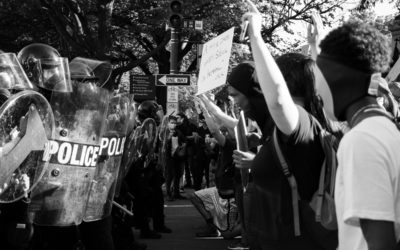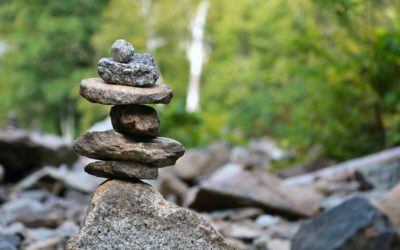This post is inspired by a question from a friend.
I experienced trauma in my childhood. Beginning in college, I have done footwork, with help, to heal those wounds. My friend knows this history, and so asked me what helps when past trauma makes itself known in the now. What follows is close to what I wrote to my friend. I feel it important to share my experience, to offer insight into what the long term effects of trauma can be. Blessings.
Having old trauma come up feels like being on a stroll and suddenly a wall appears and I smack into it. Whether or not I see it and expect impact, I hit it, and it hurts. And, damn it, now there’s this wall in my path and I’m on the ground. I feel anger – toward myself for not avoiding it, for not being strong enough to plow through it, for having the damn wall in the first place. I feel anger toward the wall for being there, toward the world for having such walls, and sometimes toward the one(s) responsible for the wall’s existence in the first place. I feel disoriented and discouraged. I expected my path to now be clear, and this wall is back again.
I ask myself WHY??? Why me? Why this again? I ask if I will ever be free of this unwelcome activation1. Will I ever be able to live a normal life? Will I always be stuck in the aftermath of traumatic experience? If x hadn’t happened to me… If I weren’t broken… I should be able to heal from this and be done with it. I would be in a different place in my life if it weren’t for having to deal with all this trauma schizzle.
At some point, I reach out. Or someone reaches out to me enough for me to respond. I connect with another, and then maybe another. I remember there is life out there. I remember I am not alone. I find hope and gain some momentum for living. I take one step, then another, then another. I put in the work to process what I experienced within the context of who I am today. I heal from the trauma and start to feel really good again. I get some traction and make some progress toward my life goals. I am strolling along.
Then, up pops the wall again, and I am once again bruised and lying on my back.
I go through the cycle again. Anger. Despair. Seeking help. Recovery. Reactivation.
Again. Not exactly like the time before, but the same general pattern is there.
Again.
Again.
Again.
I don’t have any magic formula for what to do to make it any easier. I can say that over the years and over the cycles, a couple shifts of perspective have helped ease the suffering when my past traumas show up to say hello.
1. A gradual gentling. Therapists, friends, acquaintances have all helped me move from rejecting the fact of my experience and its continued influence in my life toward embracing and welcoming it. I welcome my past trauma, not because I am grateful for it or because I like it; I welcome it because it is part of my history. In my journey toward gentling, I am moving from rejecting parts of myself to embracing and welcoming all of me.
2. A gradual living into the wisdom that each time the wall appears, it can be a gateway to greater freedom. As I have learned to trust the painful cycle outlined above, I fight the process less. My anger is less. My despair has a shorter life. The energy I used to put into fighting the fact of the wall I now put toward finding the freedom. I have grown to trust the effort to work through my stuff is worth the payoff in loving myself and being more comfortable in my own skin.
These shifts took years, and I still can move back into the familiar perspectives. For the shorter term, I have found the following helpful:
-
- Honoring my spoons
- In Spoon Theory, a spoon is a unit if measure of physical and emotional energy. Christine Miserandino originally used it as a way to describe what it is like to have to budget her energies throughout the day as a consequence of living with lupus. Honoring my spoons means I check in with myself and honor the limits for that day.
- Reaching out to trusted supportive people
- I talk to people who have earned the privilege to hear my story. These include professionals, friends, and family. These are folk who listen well and don’t jump in with solutions. They trust I will find those solutions in my own way and time (and I do). Early in my journey, I had one, maybe two people. That was enough for me to start to heal.
- Expressing my anger
- If I don’t express my anger, I turn it upon myself, and can get entrenched in depression. I make arts. I use crayons or paint or pencil. I don’t go for beauty; I go for expression. I use my words. I write. I vent to friends, my cats, or to the Divine. I move my body. Often this is going for a walk, pulling weeds, or building something out of wood.
- EMDR
- EMDR (Eye Movement Desensitization and Reprocessing) is a form of therapy effective at reducing distress associated with past traumas. It has been for me a source of freedom.
- Taking steps to protect myself
- Being intentional about my exposure to activating people/places/things. The act of making the choice is empowering.
- Engaging in activities I am good at and enjoy
- When I am struggling, it helps to experience myself doing something well. It reminds me that I do have useful skills and abilities. I feel better about myself for a bit and find more energy for the healing process.
- Adjusting my expectations of myself
- One of the ideas that has helped me do this is: each day’s best is different. Yesterday I was able to do X. Today X feels overwhelming. Yesterday, my best included doing X. Today, my best includes honoring that I feel overwhelmed by X.
- Celebrate / Give myself credit for ALL the things
- On hard days, it helps me to name all the things I have accomplished – and I get specific and basic. I get credit for: turning off my alarm, getting out of bed, eating breakfast, answering the phone, sending a text, dressing, brushing my teeth, feeding the cats.
- Honoring my spoons
When I was in college and first beginning to process my trauma, I told a someone who knew my story, “Because of who I am and my history, everything I do is a miracle.” It was an empowering statement. I don’t return to those exact words all the time, though I do return to the sentiment. I acknowledge that this shit is HARD. And I’ve been through it and I still have life in me. I’m BADASS. You are too.
1. I prefer the less violent terms “activate” and “activating” rather “trigger” or “triggering.”





0 Comments